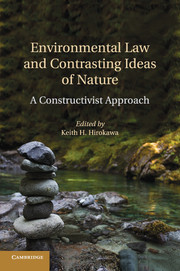10 results
Introduction: Constructing Nature through Law
-
-
- Book:
- Environmental Law and Contrasting Ideas of Nature
- Published online:
- 05 July 2014
- Print publication:
- 17 July 2014, pp 1-11
-
- Chapter
- Export citation
Environmental Law and Contrasting Ideas of Nature - Half title page
-
- Book:
- Environmental Law and Contrasting Ideas of Nature
- Published online:
- 05 July 2014
- Print publication:
- 17 July 2014, pp i-ii
-
- Chapter
- Export citation
Index
-
- Book:
- Environmental Law and Contrasting Ideas of Nature
- Published online:
- 05 July 2014
- Print publication:
- 17 July 2014, pp 333-343
-
- Chapter
- Export citation
1 - Nature in a Constructed World: Grounding the Constructivist Method
-
-
- Book:
- Environmental Law and Contrasting Ideas of Nature
- Published online:
- 05 July 2014
- Print publication:
- 17 July 2014, pp 12-27
-
- Chapter
- Export citation
Environmental Law and Contrasting Ideas of Nature - Title page
-
-
- Book:
- Environmental Law and Contrasting Ideas of Nature
- Published online:
- 05 July 2014
- Print publication:
- 17 July 2014, pp iii-iii
-
- Chapter
- Export citation
Dedication
-
- Book:
- Environmental Law and Contrasting Ideas of Nature
- Published online:
- 05 July 2014
- Print publication:
- 17 July 2014, pp v-vi
-
- Chapter
- Export citation
Copyright page
-
- Book:
- Environmental Law and Contrasting Ideas of Nature
- Published online:
- 05 July 2014
- Print publication:
- 17 July 2014, pp iv-iv
-
- Chapter
- Export citation
Contents
-
- Book:
- Environmental Law and Contrasting Ideas of Nature
- Published online:
- 05 July 2014
- Print publication:
- 17 July 2014, pp vii-viii
-
- Chapter
- Export citation
Contributors
-
-
- Book:
- Environmental Law and Contrasting Ideas of Nature
- Published online:
- 05 July 2014
- Print publication:
- 17 July 2014, pp ix-xvi
-
- Chapter
- Export citation

Environmental Law and Contrasting Ideas of Nature
- A Constructivist Approach
-
- Published online:
- 05 July 2014
- Print publication:
- 17 July 2014

